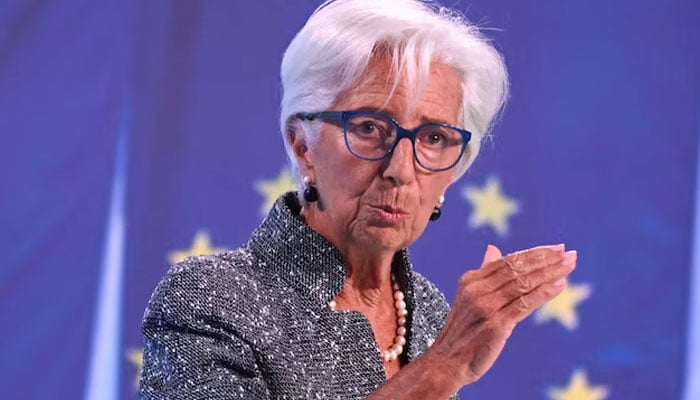ECB chief urges more EU integration as threats grow
FRANKFURT: ECB chief Christine Lagarde on Friday stepped up calls for greater financial integration in Europe, warning of threats to free trade and of a growing gap with the United States.
In a speech in Frankfurt, where the European Central Bank is headquartered, Lagarde warned that “the geopolitical environment has become less favourable, with growing threats to free trade from all corners of the world.”
“Europe’s declining innovation position has come more clearly to light. The technology gap between the United States and Europe is now unmistakeable,” she added.
These factors meant that “the urgency to integrate our capital markets has risen”, she said.
Donald Trump’s looming return to the White House is causing jitters across Europe due to the president-elect’s threat to hike tariffs on all imports into the United States.
He has singled out the EU, and its sizeable trade surplus with the United States, for particular criticism.
In her remarks Lagarde was referring to the “capital markets union”, a project long championed by the ECB aimed at helping the single currency area better compete with major economies like the United States. But she warned that the project was at risk of suffering “death by a thousand cuts”.
Problems arose from a “loose definition” of capital markets union and “the piecemeal legislative approach this creates”, she said. Since 2015 numerous proposals had been put forward with regard to the project, but this allowed it “to be picked apart by national vested interests that see one or another initiative as a threat,” according to Lagarde.
As a key step, Lagarde suggested the introduction of standardised, EU-wide savings products to encourage Europeans to invest more and across borders, and shift assets out of cash and bank deposits.
Most European savings stay in the savers’ home countries due to fragmented markets, she said, with institutional investors preferring US markets over EU ones.
-
 Andrew Mountbatten-Windsor Throws King Charles A Diplomatic Crisis
Andrew Mountbatten-Windsor Throws King Charles A Diplomatic Crisis -
 Barack Obama Hails Seahawks Super Bowl Win, Calls Defense ‘special’
Barack Obama Hails Seahawks Super Bowl Win, Calls Defense ‘special’ -
 Pregnant Women With Depression Likely To Have Kids With Autism
Pregnant Women With Depression Likely To Have Kids With Autism -
 $44B Sent By Mistake: South Korea Demands Tougher Crypto Regulations
$44B Sent By Mistake: South Korea Demands Tougher Crypto Regulations -
 Lady Gaga Makes Surprising Cameo During Bad Bunny's Super Bowl Performance
Lady Gaga Makes Surprising Cameo During Bad Bunny's Super Bowl Performance -
 Paul Brothers Clash Over Bad Bunny's Super Bowl Performance
Paul Brothers Clash Over Bad Bunny's Super Bowl Performance -
 South Korea: Two Killed As Military Helicopter Crashes During Training
South Korea: Two Killed As Military Helicopter Crashes During Training -
 Elon Musk Unveils SpaceX’s Moon-first Strategy With ‘self Growing Lunar City’
Elon Musk Unveils SpaceX’s Moon-first Strategy With ‘self Growing Lunar City’ -
 Donald Trump Slams Bad Bunny's Super Bowl Performance: 'Absolutely Terrible'
Donald Trump Slams Bad Bunny's Super Bowl Performance: 'Absolutely Terrible' -
 Jake Paul Criticizes Bad Bunny's Super Bowl LX Halftime Show: 'Fake American'
Jake Paul Criticizes Bad Bunny's Super Bowl LX Halftime Show: 'Fake American' -
 Prince William Wants Uncle Andrew In Front Of Police: What To Expect Of Future King
Prince William Wants Uncle Andrew In Front Of Police: What To Expect Of Future King -
 Antioxidants Found To Be Protective Agents Against Cognitive Decline
Antioxidants Found To Be Protective Agents Against Cognitive Decline -
 Hong Kong Court Sentences Media Tycoon Jimmy Lai To 20-years: Full List Of Charges Explained
Hong Kong Court Sentences Media Tycoon Jimmy Lai To 20-years: Full List Of Charges Explained -
 Coffee Reduces Cancer Risk, Research Suggests
Coffee Reduces Cancer Risk, Research Suggests -
 Katie Price Defends Marriage To Lee Andrews After Receiving Multiple Warnings
Katie Price Defends Marriage To Lee Andrews After Receiving Multiple Warnings -
 Seahawks Super Bowl Victory Parade 2026: Schedule, Route & Seattle Celebration Plans
Seahawks Super Bowl Victory Parade 2026: Schedule, Route & Seattle Celebration Plans




